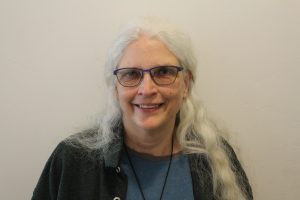by Jessica Lewis
At about 8:30 a.m. Nov. 8, former Paradise resident Paula Edgar received a call from a friend on the other side of town, warning her that a fire had broken out.

“We didn’t even think we were in danger at first, but we thought we would start packing — just in case,” Edgar said.
When Edgar took her first load of items to her vehicle, she saw the flames making their way up the street toward her house. She realized then that this was something unlike anything the town had gone through before.
“I told my husband, we have to leave now, but he wouldn’t leave until he found the cats,” Edgar recalled. “If I went out one side of my driveway, there was fire, so I turned onto Skyway. There were already towers of flames on both sides of the road. I didn’t know if me or my husband were going to make it out alive, but we both did, thankfully.
“I’ve lived in Paradise for 36 years,” Edgar added, “but nothing had ever swept all the way through town like the Camp Fire did.”
The Camp Fire became known as the sixth deadliest wildfire in the United States after raging on for 17 days before reaching 100 percent containment and taking 86 lives. Edgar calls herself a “climate refugee” because the Camp Fire is considered a climate-fueled fire. Climatic changes helped make the fire particularly explosive, scientists say.
“That was an unusual fire,” Edgar noted. “Those huge, merciless monster fires are happening more and more, and will continue to happen. The heat and the drought are what make things spread so quickly.
“There are people sleeping in tents and cars,” Edgar pointed out. “We are all refugees from this fire, and there are refugees from these types of disasters globally.”
Currently, Edgar, her husband, and one of her two cats that survived the Camp Fire have relocated to a temporary place in Grass Valley while they figure out where they would like to go from there. They have already chosen not to move back to Paradise even after rebuilding is underway.
“We raised three kids there,” said Edgar, who is 63. “My youngest was born there. We were going to live there forever until the end, and now we have to figure out where else we want to live. I know other people our ages are into the idea of going and rebuilding, but it’s going to be such a massive project that’s going to take so much time.
“I’m concerned about the toxicity and I’m concerned about the fire risk. I don’t want to live anywhere with a fire risk anymore. I don’t want to do that again.”
Edgar and her husband are exploring if they want to reside in the Chico area, where there are many more friends, family, and places they’re familiar with.
“We’ve always liked the Pacific Northwest, and it’s like, well, now’s our opportunity, we could go. We just don’t know if we want to be that far from family,” Edgar said.
According to a map created by the Camp Fire Survivors Facebook group, while many refugees have remained in parts of California, others have scattered to places throughout the United States.
“There are many levels of loss,” Edgar said. “Loss of community and loss of friends is one of the great losses. There’s the loss of our house, loss of everything that was in it, and then there’s the loss of our community. It’s something that needs to be grieved…”
Edgar was active in environmental organizations before the Camp Fire, but now it’s “personal,” she said. She points out that there are several different groups in Chico that are addressing the climate issue, including Chico 350 and Climate Uprising. She also believes there are other things that people can do to help stop the effects of global warming.
“We can try to reduce our own carbon footprint,” Edgar said. “We can get involved in some of these groups. There’s legislation right now that can help advocate for the cause, so contact your representatives. There’s so many different ways you can become involved, on many different levels, and as long as you’re doing something, it’s going to help.”
Jessica Lewis is a fourth-year journalism student at California State University, Chico, interning with ChicoSol. She will graduate in May with a BA in journalism, a specialty in public relations and a minor in photographic arts. This story is the first in a series on Camp Fire survivors.

To have found this article years after the fire, I can`t imagine the pain and loss.
Having known Paula Edgar when she lived in Los Angeles made it more painful and personal.
I can only hope that their lives have got better and the family has healed and become whole since I have loss contact with her. May God Bless the rest of their lives on earth,